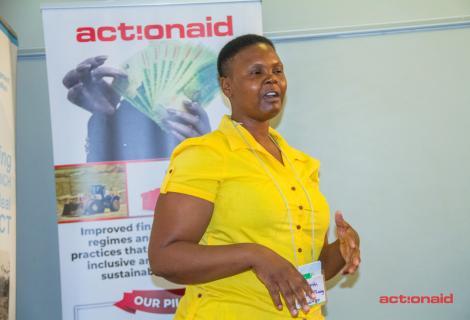Towards government and corporate improved responsibility and accountability

Focusing on mining induced displacements
By Darlington Chidarara, Projects Coordinator, Civic Participation and Accountability, ActionAid Zimbabwe
Community members living in mining and mineral rich rural areas of Zimbabwe have expressed their grave concern over the increased threats and displacements they continue to face due to mining operations taking place in their areas. These sentiments were aired at the 8th edition of the Zimbabwe Alternative Mining Indaba (ZAMI) which was held from the 18th - 20th of September 2019 in Bulawayo.
The ZAMI was spearheaded by ActionAid Zimbabwe (AAZ) partners, the Zimbabwe Environmental Law Association (ZELA), the Zimbabwe Coalition on Debt and Development (ZIMCODD) and the Zimbabwe Council of Churches (ZCC) and the African Forum and Network on Debt and Development (AFRODAD). The ZAMI, is an annual multi-stakeholder engagement platform on mineral resource governance, which has grown as a movement bringing together communities affected by mining activities, Civil Society Organisations (CSOs), Faith-Based Organizations (FBOs), social movements, small scale miners, the academia, traditional leaders, local government, Community Share Ownership Trusts (CSOTs), relevant government ministries, departments and agencies, corporates, and the media.
This year’s ZAMI which ran under the theme Sustainability for all: Building a legacy of citizen action for equitable and just natural resource governance in Zimbabwe, was attended by 289 participants. ZAMI’s objective is to ensure that citizens are mobilized and empowered to actively participate in the formulation and implementation of policies that enable sustainable socio-economic development hinged on mineral wealth exploitation. The indaba movement has over the past years advanced collective action of marginalized communities to shift unequal power through amplifying their voices. Given the country’s vast mineral resource endowments, if judiciously exploited they can lead to sustainable socio-economic growth, industrialization, job creation, and investment in human development projects – health and education thus contributing to fighting poverty, injustice and create gender equality. This vision is also enshrined in the Africa Mining Vision (AMV).
ActionAid Zimbabwe, ActionAid Zambia, ZELA and the Centre for Conflict and Management and Transformation (CCMT) partnered to convene a ZAMI side event on mining induced displacements. The session was attended by almost 80 people from various backgrounds including Rural District Councils, District Development Coordinators, ward councilors, the Environmental Management Agency, CSOs, communities living in mining areas, community based organisations and the media. Setting the scene, Richard Ncube from ZELA noted some of the most recent threats of eviction in Mutoko and the displacements of Chiadzwa communities who after over 5 years of relocation have not yet been compensated.
CCMT shared the research findings of their recently published study entitled, Challenges to Compensation of Rural Communities Displaced by Development Projects in Zimbabwe. The research’s key findings were that communities in two out of the three research areas of Mberengwa and Zvishavane were dissatisfied with the way the relocation processes were conducted as it was not done in a consultative manner. They were also not satisfied with the compensation package they received. The research recommended that inclusive and transparent public consultations were key to a successful relocation process.
Precious Nkandu of ActionAid Zambia weighed in on the issue of compensation and stressed on the governments of Zimbabwe and similarly Zambia to come up with clear compensation policies and proper mechanisms to undertake the valuation of compensation. As part of the ZAMI side session on mining induced displacements, ActionAid Zimbabwe played a documentary of the people of Vhimba, Chimanimani facing a threat of eviction to add to the pool of evidence-based research and advocacy. The documentary exposed Zimbabwe’s weak land tenure system in communal areas which has made communities vulnerable resulting in them facing mining induced displacements and relocations. Lack of title to communal lands and the absence of a concrete national relocation law or policy means when there is development on the land, the communities lack a say in these matters and usually find themselves with no bargaining power against the state.
The robust engagements led to the side session adopting declarations that fed into the greater ZAMI declarations. These are summed up as follows; • There is need for the law to provide secure tenure for communal land dwellers and resettled farmers to deal with issues of farmer-miner conflicts; • Free Prior and Informed Consent should be undertaken before the kickstart of any mining operation; • Mining companies must obtain a social licence to operate only after consulting locals. At the end of the event there was no doubt that ZAMI lived up to its expectations. Long live #ZAMI2019